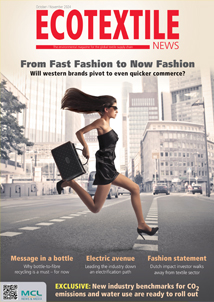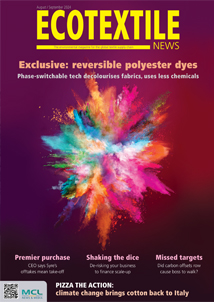WAKEFIELD – In the second of this three-part podcast series: 'Threaded Together – How best to measure cotton’s environmental impact' host Philip Berman talks to Dr Jesse Daystar from Cotton Incorporated and Joel Mertens from the Sustainable Apparel Coalition about the challenges of measuring sustainability in the cotton industry and how using life cycle assessments (LCA) can drive real change.
They enjoy a wide-ranging discussion covering issues such as the effectiveness of LCA tools and how to bridge the apparent gap between LCAs, the relevant tools and the role of nuance and interpretation.
Take a look at our podcast archive HERE
Highlighting the effectiveness of LCA tools, Daystar says that the system has been, and continues to be, a process that can effectively track, measure and monitor data.
"There's a lot of nuance behind what that actually looks like," he tells Berman. "I think that the work that Joel and I have been doing collaboratively with the SAC is a good example of how we go back to the principles of what life cycle assessment is and build it from ground up in a way that actually works for the cotton industry and the apparel industry."
Mertens agrees, explaining that the industry is seeing a lot of use of LCA data in product tool form, which is, he says, where the Higg Materials Sustainability Index and product module fit in. However, the interpretation phase is generally omitted. "We can get you to a footprint, but what can you take away from that footprint?" he asks. "What should you be doing with that information? That's where there's more of a role that we need to evolve and improve on."
Relating his experience of his role in the recent Higg MSI review, Daystar tells Berman that was there is some good alignment and some areas that could be improved. "If you just use the MSI, looking at the materials, say at a fabric level and not at a product level, as you would in the product tool, you don't have the aspect of durability, longevity, use or reuse - all those different factors or impacts are not included."
Daystar also highlights the limitations of the LCA, such as the lack of inclusion of the environmental impacts of plastic pollution, particularly microplastics from apparel, and the work being done to resolve this.
"That's a whole other area that is evolving," he tells Berman. "And frankly, a limitation of life cycle assessment is that it doesn't have all impacts, particularly social and emerging topics such as microplastics. So hopefully over the next few years, we can finish that development and roll that out and have it adopted in tools like the Higg index and other industry tools."
Cotton Incorporated is a US-based, not-for-profit company, that provides resources and research to help companies develop and market innovative, and profitable cotton products.
Episode one of this Threaded Together podcast in this series can be found HERE.
Subscribe to our podcasts and radio shows by following us on Apple, Google, Spotify and Amazon Music, to automatically get alerts when we launch a new Ecotextile Talks Behind the News podcast.












































